
Debu Tripathy, MD
Articles by Debu Tripathy, MD




This review article written by Danielle Gentile, PhD, et al, reviews the management of cancer-related fatigue in integrative oncology.


“If we can understand the mechanisms of resistance to be able to monitor [patients] in real time, then we will be able to turn many cases of cancer into chronic diseases.”
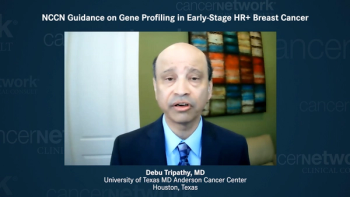
Debu Tripathy, MD, of the University of Texas MD Anderson Cancer Center, comments on current NCCN recommendations for the use of prognostic and predictive gene profiling assays to individualize treatment in patients with HR-positive breast cancer.
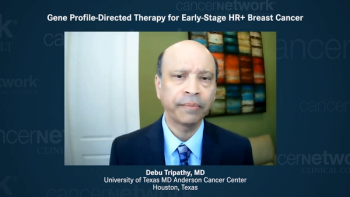
Considerations for using gene profiling assays to identify appropriate patients for neoadjuvant therapy in early-stage HR-positive breast cancer.
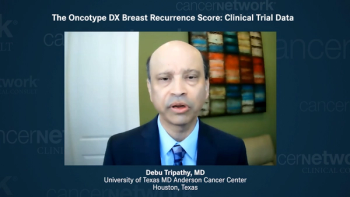
Results of 2 prospective, randomized clinical trials of the Oncotype DX Breast Recurrence Score and implications for practice.
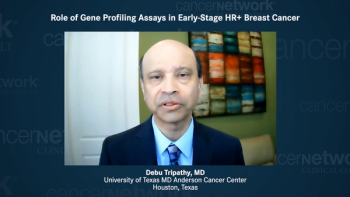
The role of gene profiling assays in identifying candidates for chemotherapy in early HR-positive breast cancer.
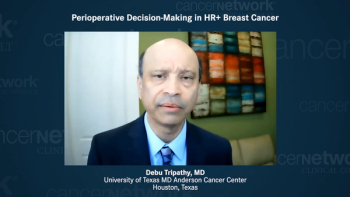
Considerations for therapeutic decision-making in adjuvant and neoadjuvant settings in early-stage HR-positive breast cancer.
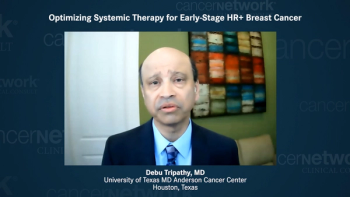
Goals and standards of care for therapy in patients with early-stage HR-positive breast cancer.
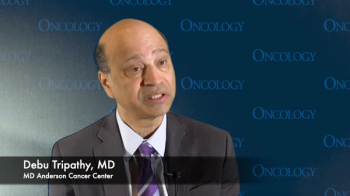
The breast medical oncologist discussed new treatment options for triple negative breast cancer as new targets become readily available for this aggressive cancer type.

Cancer Network spoke with Debu Tripathy, MD, Chair of Breast Medical Oncology at MD Anderson Cancer Center, on how ribociclib plus hormone therapy extends survival for patients with premenopausal advanced HR-positive breast cancer.

The opening chapters in the investigation of poly(adenosine diphosphate [ADP]–ribose) polymerase (PARP) inhibitors as cancer therapeutics have been interpreted by some as a quantum leap forward in targeted and personalized medicine and by others as another example of disappointment following a flurry of promising preclinical and early clinical trials based on elegant biology.

In early 2008, based on the results of its E2100 trial, which showed significant improvements in progression-free survival when combined with paclitaxel, Avastin (bevacizumab) gained an FDA accelerated approval. Median progression-free survival in the Avastin arm was 11.3 months compared with 5.8 months for paclitaxel alone (although overall survival in the two arms was similar). However, final approval would be dependent on subsequent trials showing similar degrees of benefit. When two additional trials were submitted for review, both showed significant improvements in progression-free survival, but again with no difference in overall survival. Subsequently, on July 20th of this year, the Oncologic Drugs Advisory Committee (ODAC) voted 12 to 1 not to recommend permanent approval of Avastin as first-line therapy in advanced breast cancer.

Ron Piana, Executive Editor for Special Projects with the journal ONCOLOGY, spoke with nationally regarded breast cancer specialist, Dr. Debu Tripathy, co-course director for the 27th Annual Miami Breast Cancer Conference.

We have known for some time that endocrine-responsive patients should probably receive an AI, but studies presented at SABCS provided some answers to our questions: Should we start with tamoxifen and then switch to an AI or is the best approach to initiate treatment with an AI from the start?

This practical review on the use of serum markers and circulating tumor cells (CTCs) focuses on the role of these assays in the management of patients with breast cancer and contains important information and perspectives for the practicing oncologist. The varying roles of these markers in early-stage and advanced disease are presented, and the implications in management are quite different in each setting.

Multidisciplinary approachesto many human diseases areemerging as effective, patient-centered strategies in diverse areassuch as cancer, neurology, andcardiovascular disease. However, theyrequire significant organizational andfinancial resources. Dr. Rabinowitz articulatesthe key benefits of multidisciplinarycare for breast cancer, includingteam planning and coordination of care.There is not much objective informationto definitively prove that “centerbased”care leads to superior outcomesin terms of recurrence or survival. Thedata cited in this review include improvementsin measures of patient comfortand satisfaction with care, whichare important from an emotional standpointand even make business sense.This alone should motivate cancer careproviders to organize breast centers thatare designed appropriately given thesize of the population served and theresources available.
Latest Updated Articles
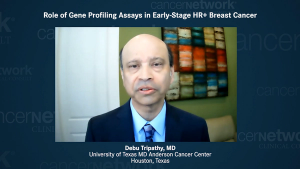 Role of Gene Profiling Assays in Early-Stage HR+ Breast Cancer
Role of Gene Profiling Assays in Early-Stage HR+ Breast CancerPublished: May 20th 2021 | Updated:
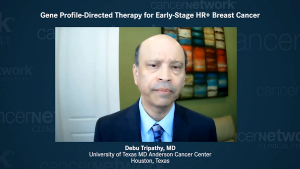 Gene Profile-Directed Therapy for Early-Stage HR+ Breast Cancer
Gene Profile-Directed Therapy for Early-Stage HR+ Breast CancerPublished: May 21st 2021 | Updated:
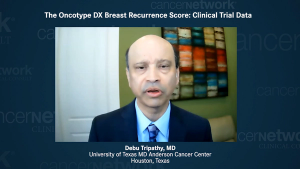 The Oncotype DX Breast Recurrence Score: Clinical Trial Data
The Oncotype DX Breast Recurrence Score: Clinical Trial DataPublished: May 20th 2021 | Updated:
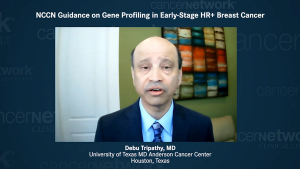 NCCN Guidance on Gene Profiling in Early-Stage HR+ Breast Cancer
NCCN Guidance on Gene Profiling in Early-Stage HR+ Breast CancerPublished: May 21st 2021 | Updated:
 24 Real-world Use of Neratinib Post-Pertuzumab (P) and –Ado-Trastuzumab Emtansine (T-DM1)
24 Real-world Use of Neratinib Post-Pertuzumab (P) and –Ado-Trastuzumab Emtansine (T-DM1)Published: April 18th 2022 | Updated:
 Tripathy Details Importance of Both Clinical Research and Patient Advocacy
Tripathy Details Importance of Both Clinical Research and Patient AdvocacyPublished: January 18th 2022 | Updated:
